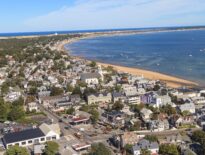
Boston Mayor Michelle Wu was flanked by giant video screens broadcasting live video of her as she delivered her annual State of the City speech at MGM Music Hall next to Boston's Fenway Park on Jan. 9, 2024. Photo by James Sanna | Banker and Tradesman staff
Boston will seek to develop 3,000 public housing units in the next decade and make it easier for residents citywide to build accessory dwelling units, Mayor Michelle Wu announced in the 2024 State of the City address.
Expanding a recently-approved pilot in Mattapan, owner-occupants will be allowed to build accessory dwelling units citywide as-of-right: both in the form of in-law apartments within homes, and new dwellings in yards.
The city will publish pre-approved designs for the housing prototypes, and offer unspecified financial aid to offset construction costs, Wu announced during Tuesday’s address at the MGM Music Hall at Fenway.
“To help more multigenerational families… this year we will eliminate barriers for residents to build ADUs citywide, and support local contractors in getting them built,” Wu said.
Abundant Housing Massachusetts, a pro-housing development group, expressed support for the ADU legalization.
“ADUs are a gentle way to add more homes to our neighborhoods, while ensuring that families stay together by providing housing for grandparents, recent graduates, or loved ones with disabilities,” Executive Director Jesse Kanson-Benanav said in a statement.
Locations of the new public housing properties will be identified in 2024, Wu said. The federal government will provide $100 million a year to maintain the additional public housing inventory.
Read our full State of the City coverage:
– Wu says no new incentives for housing developers.
– How can Boston build 3,000 new public housing units?
A new fund will be used to buy affordable apartment buildings and prevent acquisitions by developers, with the goal of preventing displacement of 400 families this year.
Building on her “Green New Deal” platform, Wu announced the city will partner with National Grid on construction the city’s first networked geothermal heating system for 346 public housing units at the Franklin Field property in Dorchester.
Wu’s remarks focused on the city government’s role in supporting families, through a series of programs supporting housing, education and the environment.
Among the key housing and real estate development accomplishments of the past year, Wu cited the approval of nearly 7,400 housing units, 31 percent of them income-restricted.
After criticizing the agency as a candidate as being out-of-touch and beholden to special interests, Wu has been restructuring the Boston Planning & Development Agency internally while expanding its workforce from 183 to 226 employees.
The BPDA is set to begin its city-wide rezoning process, known as “Squares + Streets,” early this year in most residential neighborhoods except for East Boston and Mattapan, which are the subject of recent separate planning studies.
Under the citywide rezoning, main thoroughfares and business districts will be updated to allow construction of housing with building heights ranging from 50 to 85 feet tall.
The new standards are designed to reduce the need for variances from the Zoning Board of Appeal, while offering developers more predictable expectations for how projects will be reviewed.
At the same time, Wu’s BPDA last summer standardized the required component of income-restricted units in new housing developments at 20 percent, up from the previous minimum of 13 percent. The increase has been criticized by developers already facing rising interest rates and construction costs that have delayed financing and groundbreakings.
The downtown office to housing residential conversion incentive program, launched last summer has received applications for 170 units in the Financial District and Downtown Crossing by developers that are tapping into the program’s property tax breaks.




 |
| 

